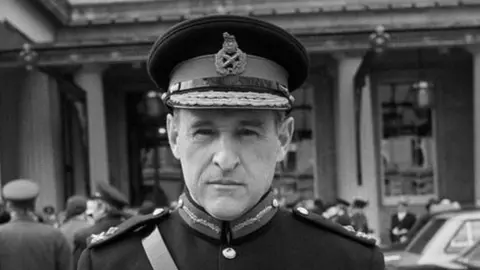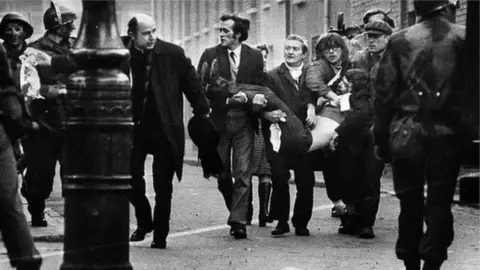Sir Frank Kitson: Ex-army chief that served in Northern Ireland dies
 PA Media
PA MediaOne of the most senior Army officers to serve in Northern Ireland during the Troubles has died aged 97.
General Sir Frank Kitson led British military operations at the beginning of the conflict in the early 1970s.
He was a key figure in Army operations during some of the most controversial and dark days of the Troubles, which included Bloody Sunday and Ballymurphy.
He was also in command when internment, which was the process of holding people without trial, was introduced.
Sir Frank oversaw operations of the 1st Battalion Parachute Regiment, which opened fire on civil rights marchers in Londonderry in 1972 on what came to be known as Bloody Sunday. Thirteen people were shot dead.
The same battalion was involved six months earlier when 10 people were killed in west Belfast in the wake of an Army operation in Ballymurphy. An inquest found in 2021 that the victims were "entirely innocent".
In his obituary in The Times, which reported Sir Frank died on 2 January, it read that "no general in recent times has provoked more intense and sustained controversy".
Controversial counter-insurgency methods
Sir Frank was a highly-decorated officer who won the Military Cross twice for his service in Kenya and Malaya and was awarded a CBE for gallantry during his time in Northern Ireland.
However, he also became a "visceral hate figure to (Irish) republicans", according to former BBC journalist Peter Taylor, who reported extensively on the Troubles.
"All things that were so controversial in the early 1970s were always left at Kitson's door," Mr Taylor told BBC Radio Foyle's The North West Today.
Sir Frank was heavily involved in counter-insurgency methods, and established the Military Reaction Force (MRF), an undercover Army unit which was disbanded after 18 months.
Mr Taylor said the unit, which has been linked to several shootings, was "highly controversial".
"You can track counter-intelligence operations and counter-terrorist operations in Northern Ireland from Frank Kitson," Mr Taylor said.
"His fingerprints remain indelibly imprinted on those organisations."

Colum Eastwood, the MP for Foyle, told BBC News NI that Sir Frank's legacy was "a very negative one in Northern Ireland and other parts of the world".
He added that "the tactics he created and deployed on the streets of Derry, in Belfast and other places destroyed lives".
The former Army officer gave evidence to the Saville Inquiry in 2002, which examined the events of Bloody Sunday.
In a statement, the chair of the Bloody Sunday Trust Tony Doherty described Sir Frank's legacy in Northern Ireland as a "terrible one" and one that "we are still living with".
"There will be no sadness at his passing in these parts," he said.
In 2015, Sir Frank and the Ministry of Defence (MoD) were accused of complicity in an attack in February 1973 in which a 47-year-old man was killed.
Eugene Heenan was in a minibus with 14 others that was targeted by the UDA.
Mr Heenan's widow Mary took legal action against the MoD and Sir Frank, claiming her husband died because of negligence and misfeasance in office.
It was the first time a retired senior soldier had been personally sued over alleged actions during the Troubles.
